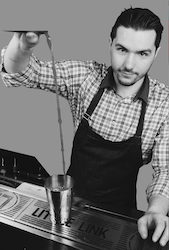
A View from the City: Cologne
Hamish Smith catches up with Cocktailkunst founder and CEO Stephan Hinz about Cologne's bar scene.
Tell us a little about the history of Cologne’s drinking culture.
Cologne is an old city with a long history of beer culture. The local beer is called Kölsch, which simply means  ‘colonian’ in the regional dialect. It’s an old style of ale served in small glasses in the typical pubs. The locals are really proud of their beer and there is a law which forbids the production of Kölsch outside of Cologne – excluding some historical exceptions near Cologne. Drinking and celebrating is an important aspect of the city’s identity, most of all at the famous Cologne Carnival.
‘colonian’ in the regional dialect. It’s an old style of ale served in small glasses in the typical pubs. The locals are really proud of their beer and there is a law which forbids the production of Kölsch outside of Cologne – excluding some historical exceptions near Cologne. Drinking and celebrating is an important aspect of the city’s identity, most of all at the famous Cologne Carnival.
When did the city get into cocktails?
The movement began slowly around 2000. High-class bars opened in the big cities of Germany and the locals in Cologne started to enjoy better cocktails as well. In the ’90s the usual mainstream drinks such as Piña Colada or Swimming Pool overwhelmed the menus and it was hard to find classic cocktails. In the early 2000s the first bartenders started to focus on better spirits and fresh ingredients. Some ingredients, such as bitters or special liqueurs, were still hard to get though.
Who and what are the pioneer bartenders and bars?
Important bars from the late ’90s are the Hemingway and the Rosebud. In the early 2000s bars such as the Shepheard started to gain attention and to redefine the cocktail culture of Cologne. Some great bars closed, of course, and new bars came up, but today we have a vital scene with a large variety, from simple dive bars to high-class cocktail bars.
Where do you think the city ranks in terms of bar scenes in your region?
Cologne is one of the most important cities for cocktail culture in Germany. There are many talented people working every night to prove that and we have a lot of award-winning bars in the city. Of course cities such as Berlin or Frankfurt are still more popular among international visitors, but Cologne is catching up quickly and the quality is unquestionable.
What are the challenges the city’s bars face?
As more bars open it becomes harder to find employees who meet our bars’ requirements. And cocktail culture is still not a part of everyday life in Germany. Most of the locals would rather go to a traditional pub than a bar. Bar culture in general seems to be a secret for insiders most of the time, so sometimes it’s hard to explain a progressive concept such as our Little Link bar. A salmon infused gin or a cocktail with eucalyptus are still confusing for some guests. But I am sure this will change step by step.
